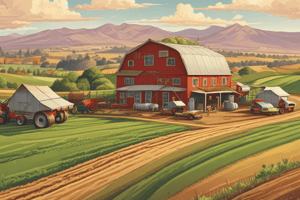Podcast
Questions and Answers
Quais fazendas familiares são frequentemente maiores nos países desenvolvidos?
Quais fazendas familiares são frequentemente maiores nos países desenvolvidos?
- Fazendas de pequeno porte em países desenvolvidos
- Fazendas de grandes proprietários em países subdesenvolvidos
- Fazendas de pequeno porte em países subdesenvolvidos
- Fazendas familiares nos Estados Unidos (correct)
Quem é o principal fornecedor de mão-de-obra em fazendas familiares nos Estados Unidos?
Quem é o principal fornecedor de mão-de-obra em fazendas familiares nos Estados Unidos?
- Sociedade de agricultores locais
- Membros da família do proprietário (correct)
- Trabalhadores temporários
- Trabalhadores contratados
Qual é o objetivo principal do Ano Internacional da Agricultura Familiar, designado pela FAO?
Qual é o objetivo principal do Ano Internacional da Agricultura Familiar, designado pela FAO?
- Reconhecer a contribuição da agricultura familiar para a segurança alimentar e o desenvolvimento sustentável (correct)
- Desenvolver a agricultura orgânica em pequenas fazendas
- Destacar a importância da agricultura familiar em países subdesenvolvidos
- Promover a agricultura intensiva em grandes fazendas
Quantas fazendas familiares são estimadas em todo o mundo, segundo a FAO?
Quantas fazendas familiares são estimadas em todo o mundo, segundo a FAO?
O que é característico das fazendas familiares, especialmente em áreas rurais?
O que é característico das fazendas familiares, especialmente em áreas rurais?
O que caracteriza a agricultura familiar?
O que caracteriza a agricultura familiar?
Qual é o papel das fazendas familiares em áreas rurais?
Qual é o papel das fazendas familiares em áreas rurais?
Por que as fazendas familiares são mais do que apenas uma empresa econômica?
Por que as fazendas familiares são mais do que apenas uma empresa econômica?
Qual é o objetivo principal dos agricultores familiares ao trabalhar na fazenda?
Qual é o objetivo principal dos agricultores familiares ao trabalhar na fazenda?
O que as fazendas familiares podem ser em termos de productividade?
O que as fazendas familiares podem ser em termos de productividade?
Flashcards are hidden until you start studying
Study Notes
Family farming refers to a type of agricultural production where the farm is managed and operated by a family, with the family providing most of the labor. This type of farming is not limited to small farms in less-developed countries, as it is also prevalent in the United States and other developed countries. Family farms are essential for food security and nutrition, livelihood improvement, natural resource management, environmental protection, and sustainable development, particularly in rural areas.
Family farming represents a direct unity of manual and mental labor, work and life, and production and development. It is not just an economic enterprise, but also a place where continuity and culture are important. Family farmers use their resources not to make a profit, but to make a living and provide for their families. The farm is a place of self-employment and progress for the family, where dedication, passion, and hard work lead to the development of the farm and the improvement of the family's livelihood.
The family farm is often a node in wider networks, where new insights, practices, seeds, and other resources circulate. It is also a place where experience accumulates, learning takes place, and knowledge is passed on to the next generation in a subtle but strong way. Family farming is not technologically backward, and it can be highly productive, sustainable, and dynamic, contributing significantly to food security and food sovereignty.
Family farms in the United States are often much larger than those in developing countries, but they still rely primarily on family labor. Larger farms may rely on hired and contract labor in addition to the labor provided by the operators and their families, but most still rely primarily on family labor. Family farms in the United States tend to be run by extended families, with multiple owner-managers specializing in different parts of the farm business.
The UN's Food and Agriculture Organization (FAO) has designated 2014 as the "International Year of Family Farming" to raise the profile of family and smallholder farming, emphasizing its role in providing food security and nutrition, improving livelihoods, managing natural resources, protecting the environment, and achieving sustainable development. The FAO's primary focus is on smallholder farms, but the International Year of Family Farming also emphasizes all family farms, which are estimated to number around 500 million globally, representing up to 80 percent of all farms in many countries.
In conclusion, family farming is a vital aspect of agricultural production that plays a crucial role in food security, livelihoods, and sustainable development, particularly in rural areas. It is a direct unity of work, life, and production, where family members provide the labor force and contribute to the farm's progress and improvement. Family farms are not limited to small farms in less-developed countries; they are also prevalent in developed countries like the United States. The International Year of Family Farming highlights the importance of these farms and their potential to contribute to a more sustainable and equitable agricultural system.
Studying That Suits You
Use AI to generate personalized quizzes and flashcards to suit your learning preferences.




